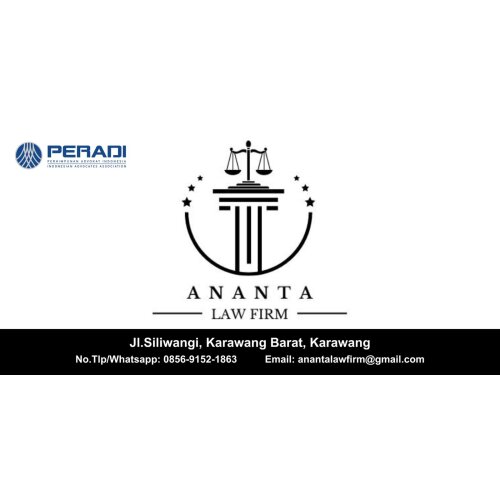Best Collaborative Law Lawyers in Indonesia
Share your needs with us, get contacted by law firms.
Free. Takes 2 min.
Free Guide to Hiring a Family Lawyer
Or refine your search by selecting a city:
List of the best lawyers in Indonesia

Jiwangga Law Office | Lawyer Surabaya | Advokat Surabaya | Pengacara Surabaya
30 minutes Free ConsultationAbout Collaborative Law in Indonesia
Collaborative Law in Indonesia is an emerging area of practice designed to address legal disputes through a cooperative approach. In Collaborative Law, both parties commit to resolving their issues amicably without resorting to litigation. This method is particularly beneficial when resolving family law disputes, business partnerships, and conflicts that require a harmonious and personalized resolution. The Indonesian legal system encourages peaceful conflict resolution, aligning well with the principles of Collaborative Law.
Why You May Need a Lawyer
Collaborative Law can be applicable in various situations, including:
- Family Disputes: Resolving divorce, child custody, and property division matters while maintaining mutual respect and cooperation.
- Business Conflicts: Addressing disagreements among partners or stakeholders in a manner that preserves professional relationships.
- Estate and Inheritance Issues: Facilitating discussions among heirs to reach a fair distribution without courtroom intervention.
- Contractual Disputes: Negotiating terms and settlements without the adversarial nature of traditional legal processes.
A lawyer trained in Collaborative Law can guide parties through structured negotiations, ensuring all voices are heard and solutions are achieved collaboratively.
Local Laws Overview
Indonesia's legal framework supports alternative dispute resolution methods, including mediation and arbitration. Key aspects relevant to Collaborative Law include:
- Family Law: Governed by various laws such as the Marriage Law and the Child Protection Law, which encourage settlement in family disputes.
- Commercial Law: The Indonesian Civil Code and business regulations recognize out-of-court settlements as a valid resolution mechanism.
- Dispute Resolution: The Arbitration and Alternative Dispute Resolution Act provides a framework supportive of non-litigation dispute resolutions.
Frequently Asked Questions
What is Collaborative Law?
Collaborative Law is a legal process where parties and their attorneys work together to resolve disputes without going to court, focusing on mutual interests and solutions.
How does Collaborative Law differ from mediation?
While both processes seek amicable resolutions, Collaborative Law is a structured, attorney-facilitated negotiation, whereas mediation involves a neutral third party to assist in settlement discussions.
Is Collaborative Law recognized in Indonesia?
Yes, Collaborative Law is increasingly recognized alongside other alternative dispute resolution methods and aligns with Indonesia's emphasis on harmony and consensus.
What types of cases are suitable for Collaborative Law?
Cases involving personal relationships, such as family and business disputes, where the parties value privacy and wish to maintain amicable relationships, are well-suited for Collaborative Law.
Can Collaborative Law save time and money?
Yes, by avoiding lengthy court procedures, parties often find they can resolve issues more quickly and with lower costs through Collaborative Law.
Do both parties need a lawyer in Collaborative Law?
Yes, each party should have a lawyer trained in Collaborative Law to ensure fair representation and guidance throughout the process.
What happens if an agreement cannot be reached?
If parties cannot reach an agreement, they may decide to proceed with other dispute resolution methods. However, the lawyers involved in the collaborative process must withdraw from any subsequent litigation.
Are Collaborative Law sessions confidential?
Yes, collaborative negotiations are confidential, ensuring privacy for all parties involved, and discussions cannot be used as evidence in court.
How do I find a lawyer specializing in Collaborative Law in Indonesia?
You can find lawyers through the Indonesian Advocates Association or by seeking recommendations from professional dispute resolution organizations.
Is Collaborative Law legally binding?
Agreements reached through Collaborative Law become legally binding when formalized in a contract or court order, ensuring enforceability under Indonesian law.
Additional Resources
For those seeking further information and support, consider consulting these resources:
- The Indonesian Bar Association (PERADI) for lawyer referrals and legal education resources.
- The Indonesian Institute for Conflict Transformation for research and resources on non-litigious dispute resolution methods.
- Local legal aid clinics providing support and guidance on Collaborative Law.
Next Steps
If you need legal assistance in Collaborative Law, consider the following steps:
- Research and compile a list of lawyers who specialize in Collaborative Law within your region of Indonesia.
- Schedule consultations to discuss your case and compatibility with each lawyer’s collaborative approach.
- Prepare relevant documentation regarding your dispute for efficient and focused discussions during your consultations.
- Ensure mutual agreement with the other party to engage in the Collaborative Law process, emphasizing the benefits of amicable resolution.
By taking these steps, you can effectively navigate the process of resolving your dispute through Collaborative Law in Indonesia.
Lawzana helps you find the best lawyers and law firms in Indonesia through a curated and pre-screened list of qualified legal professionals. Our platform offers rankings and detailed profiles of attorneys and law firms, allowing you to compare based on practice areas, including Collaborative Law, experience, and client feedback.
Each profile includes a description of the firm's areas of practice, client reviews, team members and partners, year of establishment, spoken languages, office locations, contact information, social media presence, and any published articles or resources. Most firms on our platform speak English and are experienced in both local and international legal matters.
Get a quote from top-rated law firms in Indonesia — quickly, securely, and without unnecessary hassle.
Disclaimer:
The information provided on this page is for general informational purposes only and does not constitute legal advice. While we strive to ensure the accuracy and relevance of the content, legal information may change over time, and interpretations of the law can vary. You should always consult with a qualified legal professional for advice specific to your situation.
We disclaim all liability for actions taken or not taken based on the content of this page. If you believe any information is incorrect or outdated, please contact us, and we will review and update it where appropriate.
Browse collaborative law law firms by city in Indonesia
Refine your search by selecting a city.
















